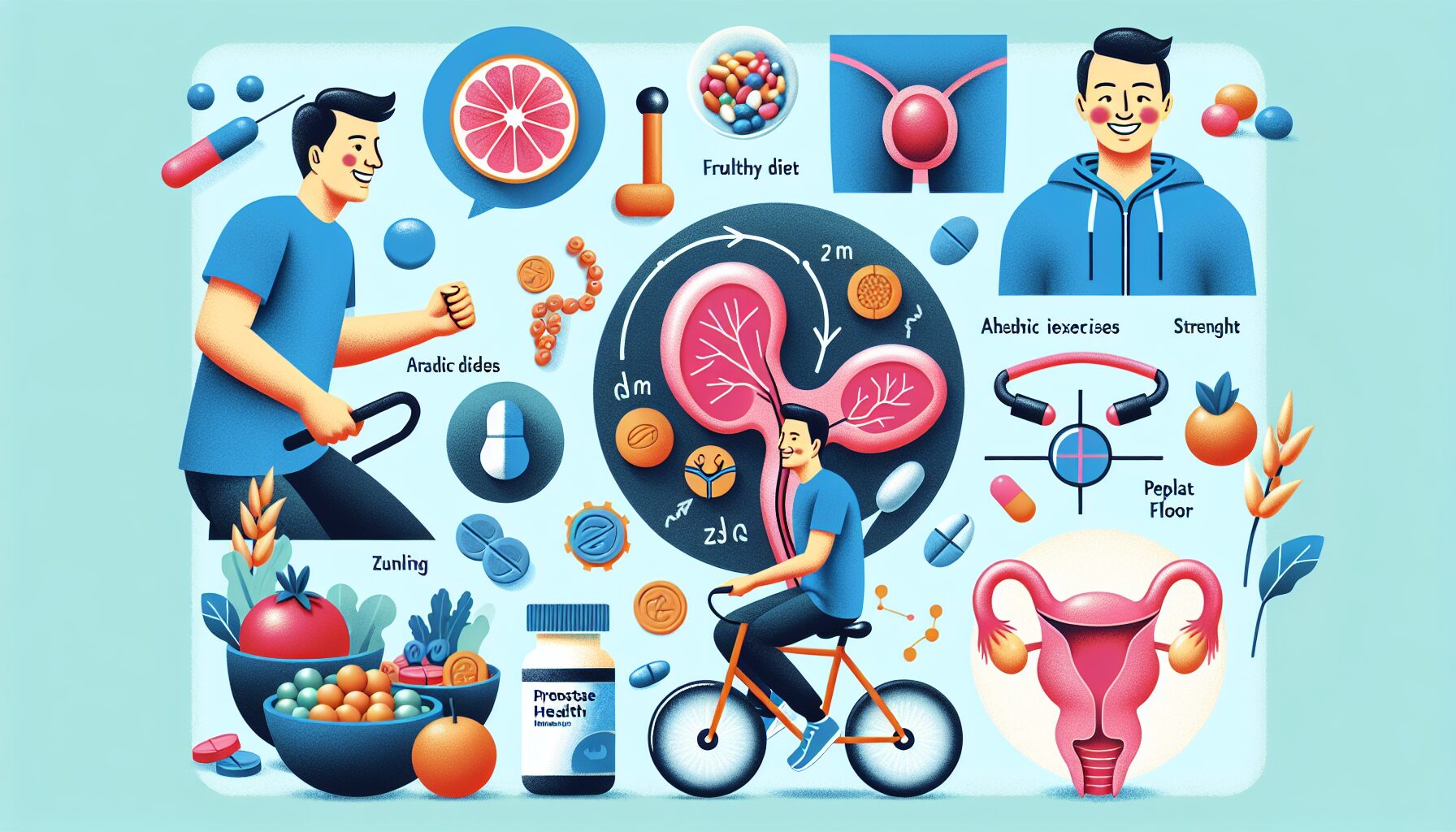🔄 Updated for 2026: This article has been refreshed to reflect the latest standards and best practices.
The Ultimate Guide to Reducing Prostate Size: Effective Strategies and Solutions
Prostate health is a crucial aspect of men’s overall well-being, yet it often remains overlooked until problems arise. One of the most common issues men face as they age is an enlarged prostate, also known as benign prostatic hyperplasia (BPH). This condition can lead to uncomfortable symptoms, such as frequent urination, a weak urinary stream, and difficulty emptying the bladder. The question many men ask is: Can anything reduce prostate size? The answer is a resounding yes. In this comprehensive guide, we will explore various strategies and solutions that have been proven to effectively reduce prostate size and improve quality of life.

Understanding the Prostate and BPH
Before diving into the solutions, it is essential to understand what the prostate is and how BPH develops. The prostate is a small gland located below the bladder and in front of the rectum. It surrounds the urethra, the tube through which urine flows out of the body. The primary function of the prostate is to produce fluid that nourishes and transports sperm.
As men age, hormonal changes can cause the prostate to enlarge. This enlargement can squeeze the urethra, leading to urinary problems. BPH is not cancerous, but it can significantly impact a man’s quality of life if left untreated.
Lifestyle Changes for Prostate Health
One of the most effective ways to reduce prostate size and alleviate symptoms of BPH is through lifestyle changes. These changes are not only beneficial for prostate health but also for overall well-being.
# 1. Diet
A healthy diet plays a vital role in maintaining prostate health. Several studies have shown that certain foods can help reduce prostate size and improve symptoms of BPH.
– Fruits and Vegetables: Consuming a diet rich in fruits and vegetables provides essential vitamins and antioxidants that support prostate health. Lycopene, found in tomatoes, watermelon, and pink grapefruit, has been shown to reduce the risk of BPH.
– Healthy Fats: Incorporating healthy fats from sources like fish, nuts, seeds, and olive oil can help reduce inflammation in the body.
– Zinc-Rich Foods: Zinc is essential for prostate health. Foods such as pumpkin seeds, oysters, and fortified cereals are excellent sources of zinc.
– Avoiding Processed Foods: Reducing intake of processed foods high in sugar and unhealthy fats can help manage weight and reduce inflammation.
# 2. Exercise
Regular physical activity is another crucial factor in reducing prostate size. Exercise helps maintain a healthy weight, improves circulation, and reduces inflammation.
– Aerobic Exercise: Activities like walking, jogging, swimming, or cycling can help improve cardiovascular health and reduce symptoms of BPH.
– Strength Training: Building muscle through resistance exercises can boost metabolism and support overall health.
– Pelvic Floor Exercises: Also known as Kegel exercises, these can strengthen the muscles around the bladder and urethra, improving urinary control.
Medical Treatments for BPH
While lifestyle changes are essential for long-term management of prostate health, some men may require medical interventions to reduce prostate size effectively. Several medical treatments have been proven to alleviate symptoms and shrink the prostate.
# 1. Medications
There are two main categories of medications used to treat BPH:
– Alpha Blockers: These medications relax the muscles around the urethra, making it easier to urinate. Common alpha blockers include tamsulosin (Flomax) and alfuzosin (Uroxatral).
– 5-Alpha Reductase Inhibitors: These medications work by blocking the hormone responsible for prostate growth. Finasteride (Proscar) and dutasteride (Avodart) are commonly prescribed 5-alpha reductase inhibitors.
In some cases, a combination of these medications may be recommended for more effective symptom relief.
# 2. Minimally Invasive Procedures
For men who do not respond well to medications or have severe symptoms, minimally invasive procedures can provide significant relief:
– Transurethral Microwave Thermotherapy (TUMT): This procedure uses microwave energy to heat and destroy excess prostate tissue.
– Transurethral Needle Ablation (TUNA): Radiofrequency energy is used to ablate excess tissue.
– Laser Therapy: High-energy lasers can remove or shrink excess tissue with minimal bleeding.
# 3. Surgical Options
In cases where other treatments are ineffective or not suitable, surgical options may be considered:
– Transurethral Resection of the Prostate (TURP): This procedure involves removing part of the prostate through the urethra.
– Prostatectomy: Surgical removal of part or all of the prostate gland may be necessary in severe cases.

Natural Remedies for Prostate Health
In addition to lifestyle changes and medical treatments, several natural remedies have shown promise in reducing prostate size and improving symptoms:
# 1. Saw Palmetto
Saw palmetto is a popular herbal supplement that has been used for centuries to treat urinary symptoms associated with BPH. Studies suggest that it may inhibit the enzyme responsible for converting testosterone into dihydrotestosterone (DHT), a hormone linked to prostate growth.
# 2. Beta-Sitosterol
Beta-sitosterol is a plant sterol found in various foods such as nuts, seeds, fruits, and vegetables. It has been shown to improve urinary flow and reduce residual urine volume in men with BPH.
# 3. Pygeum Africanum
Extracts from the bark of Pygeum africanum have been used traditionally to treat urinary problems. Some studies indicate that it may help reduce nighttime urination (nocturia) and improve overall urinary function.
Conclusion
While an enlarged prostate can significantly impact a man’s quality of life, there are numerous effective strategies for reducing its size and alleviating symptoms. By adopting a healthy lifestyle that includes a balanced diet rich in fruits and vegetables, regular exercise, and maintaining a healthy weight, men can support their prostate health naturally.
For those requiring additional intervention, various medical treatments ranging from medications to minimally invasive procedures are available. Natural remedies such as saw palmetto, beta-sitosterol, and Pygeum africanum also offer potential benefits for managing BPH symptoms.
Ultimately, taking proactive steps toward maintaining prostate health can lead to improved quality of life and overall well-being. If you are experiencing symptoms of an enlarged prostate, consult with your healthcare provider to determine the best course of action tailored to your needs.
“`html
2026 Update: What’s New
The landscape of prostate health management has evolved significantly in 2025-2026, with breakthrough treatments and refined diagnostic approaches reshaping patient care. The FDA’s approval of next-generation aquablation robotics in early 2025 has revolutionized minimally invasive procedures, offering precision tissue removal with significantly reduced recovery times compared to traditional TURP surgery.
Personalized medicine has taken center stage, with AI-powered MRI analysis now standard in major urology centers for accurate prostate volume assessment and treatment planning. The 2025 American Urological Association guidelines now recommend earlier intervention for moderate BPH symptoms, shifting away from the previous “watchful waiting” approach based on compelling long-term outcome data.
Combination therapy protocols pairing 5-alpha reductase inhibitors with newer selective alpha-blockers have demonstrated 40% better symptom improvement rates in 2025 clinical trials. Additionally, pulsed electromagnetic field therapy devices received FDA clearance for home use in late 2025, providing a non-pharmaceutical option for mild-to-moderate cases.
- Consider AI-enhanced imaging for accurate diagnosis before starting treatment
- Discuss aquablation as a first-line surgical option with your urologist
- Ask about combination drug therapy protocols for improved outcomes
- Explore FDA-cleared electromagnetic therapy devices for non-invasive management
Last updated: February 21, 2026
“`
